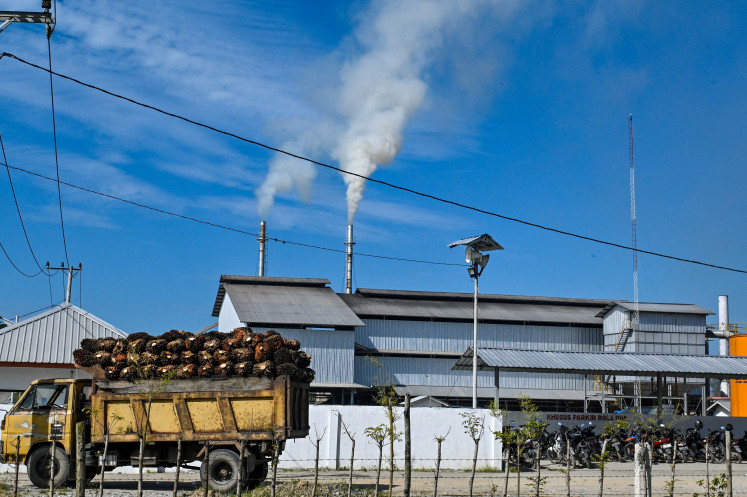Popular Reads
Top Results
Can't find what you're looking for?
View all search resultsPopular Reads
Top Results
Can't find what you're looking for?
View all search resultsCutting the legs off Indonesia's oil industry
A famous Greek myth tells about a man who keeps a house by the side of the road
Change text size
Gift Premium Articles
to Anyone
A
famous Greek myth tells about a man who keeps a house by the side of the road. He offers his hospitality to passing strangers, inviting them in for a night's rest in his very special one-size-fits-all bed. But as soon as the guest lies down, if he is too short, the guesthouse owner stretches him on the rack; if the guest is too tall, he loses his legs.
Regulations in Indonesia are sometimes like a 'one-size-fits all' bed: with good intentions, but inappropriate solutions.
For example, a new regulation bans the use of foreigners above the age of 55 and requires expatriates to be able to speak Indonesian and be willing to transfer their knowledge and skills to Indonesian worker colleagues.
The regulation aims to increase the number of Indonesian oil and gas workers. But according to Lukman Mahfoedz, Chairman of the Indonesian Petroleum Association (IPA), it would decrease the number of qualified workers demanded by the industry.
'Indonesia is still left behind in the oil and gas technology. The easy-oil era has passed. Now, it needs more advanced technology and competent resources to discover the remaining hydrocarbon reserves. As a matter of fact, executives who are 55 years or above are those we need to recruit most due to their long-time experience.'
Oil and gas is the least ideal industry for grave policy mistakes, given its significant contribution to state revenues and export earnings
_____________
Today there are not enough university graduates to fill the demand for petroleum engineers.
However, oil exports have declined and the country now is a net oil importer experiencing its largest trade deficit in 13 years. Without new oil discoveries, it is unlikely that Indonesia will close the trade deficit in the long-term.
What Indonesia needs is better, more relevant education for its people to close the personnel shortages and skills mismatch in the market.
Today there are not enough university graduates to fill the demand for petroleum engineers. Only 30,000 of the annual 1.4 million university graduates (16 percent) are engineers, while the economy requires 50,000, amounting to a 40 percent shortfall. By 2025, the engineering shortage will rise to more than 70 percent.
Yet even as university enrollment and completion rates rise, 'a persistent complaint amongst employers is a lack of experience or of relevant skills, and a general inability for new graduates to apply their skills,' according to the 2010 Investment Climate Enterprise Survey.
To make matters worse, the Education and Culture Ministry's new national curriculum throws out science, English and social studies courses in favor of Indonesian, nationalism and religious studies.
It's an open secret that the quality of public education in Indonesia is lacking and that more should be done to reform public education. Despite getting the biggest portion of the state budget (US$30.4 billion this year) the majority is spent on building infrastructure.
Investments in teacher training programs have not proven to have a positive impact on student outcomes. According to 2012 OECD PISA scores, a test which was taken by half a million randomly selected students from around the world, Indonesia scores the same as it did before the increases in education funding.
With such poor outcomes, it is no surprise why wealthy parents send their children abroad to study. In fact, at any one time, 50,000 Indonesians are studying abroad.
Utomo Dananjaya, an education expert from Paramadina University, says that without improvements in the quality of its teachers, Indonesia will be left unable to compete on the international stage.
Additionally, the Education and Culture Ministry needs to enforce standard quality controls of universities and encourage universities to make greater industry linkages for curriculum development and practical internship opportunities in the oil industry.
In summary, education reforms are needed in the long-term. In the short-term, the industry should have the right to hire the qualified oil technicians they need to fill their personnel shortages.
If not, then key oil reserves will go unexplored, oil exploration targets will go unmet, the trade deficit from oil imports will widen and budget revenue from oil and gas will slump further, affecting potentially the entire Indonesian population.
_______________
The writer is the policy advisor at the American Chamber of Commerce in Indonesia. The views expressed are her own.










